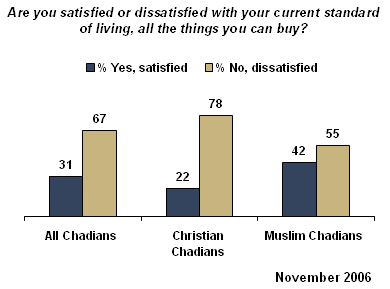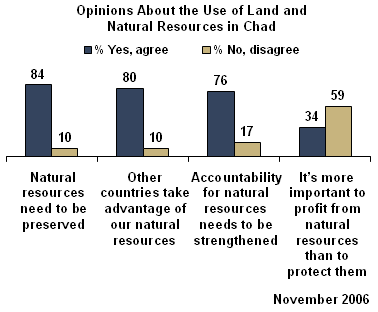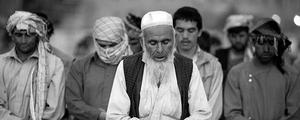GALLUP NEWS SERVICE
WASHINGTON, D.C. -- Chad has experienced strong economic growth since becoming an oil-exporting country in 2003. However, most Chadians remain dissatisfied with their current standard of living, and only a slight majority of residents believe conditions are improving. Chadians' attitudes toward job creation, whether in the predominantly Muslim North or Christian and animist South, also reveal relatively high levels of dissatisfaction, although significantly more Christians report being dissatisfied than do Muslims. What's more, people are more likely to disagree than agree with the statement that it is more important to profit from natural resources than to protect them. This highlights local concerns in a country where oil exploitation has attracted international commercial interests and foreign governments.
Economic Insecurity
Gallup World Poll interviews conducted in November 2006, three years after Chad began exporting oil, reveal that two-thirds of Chadians are dissatisfied with their current standard of living. Older respondents are more likely than younger ones to express dissatisfaction. Seventy-two percent of Chadians ages 46 and older say they are dissatisfied with their current standard of living, compared with 62% of respondents ages 15 through 18 who say the same. The poll also shows that majorities of respondents in the two major religious groups express dissatisfaction. Christians, who represent about one-third of the population and primarily reside in the South, are far more likely than Muslims, who account for more than half of the population and primarily reside in the North, to be dissatisfied, at 78% and 55%, respectively.

Gallup also asked Chadians whether their situation is improving or deteriorating. About half (51%) say their current standard of living is getting better, but 21% say it is not changing and 26% believe it is getting worse. Younger respondents are more likely than older ones to be optimistic; 57% of respondents ages 15 to 18 and those ages 19 to 29 believe their standard of living is improving, compared with 51% of respondents ages 30 to 45 and 43% of respondents ages 46 and older. Majorities of both Christians and Muslims believe their standard of living is improving, but Muslims (56%) are slightly more likely to say so than are Christians (50%).
Employment is also a critical issue for most Chadians. More than three-quarters of respondents (79%) express dissatisfaction with efforts to increase the number and quality of jobs in the country. In this case, Christians (88%) are again considerably more likely than Muslims (69%) to say they are dissatisfied. This difference may be due in part to Christians' perceptions that the government, which is controlled by Northerners, gives preference to non-Christian groups, says Elizabeth Ferris, a Fellow at the Brookings Institution in Washington, D.C.
By the end of 2005, the oil bonanza had earned Chad about $400 million in direct revenue, of which $256 million was used to fund poverty-reduction programs. Even so, the Food and Agriculture Organization of the United Nations estimates that about four-fifths of the population continues to depend on subsistence agriculture to survive. Three in four Chadians (76%) tell Gallup that there were times in the year before they were surveyed when they or their families went hungry.
Focus on Land Issues
As natural resources and agricultural products are the pillars of Chad's economy, issues of land use are critical to Chadians. Lake Chad has shrunk by 95% since 1963 and ethnic tensions have caused conflict between farmers from the South and nomadic herders from the North over access to grazing lands and water. Moreover, while the Chad-Cameroon Petroleum Development and Pipeline Project made it possible for landlocked Chad to transport oil to the Atlantic coast for export, construction of the pipeline also displaced many people, particularly in the South.
Overwhelmingly, Chadians believe individual land rights should be strengthened and that the country's natural resources should be better managed. Almost 8 in 10 (78%) say land plays an important role in conflicts and security, with Christians (85%) more likely than Muslims (71%) to say so. Other questions regarding the need to improve accountability for land-use management or strengthen land rights also elicit the approval of large majorities. For example, 79% of Chadians say land rights need to be strengthened and an equal percentage say accountability for land management needs to be improved.
Additionally, respondents emphasize the need for greater conservation and accountability in managing the country's natural resources. Eighty-four percent of Chadians say natural resources need to be preserved, and 80% believe other countries take advantage of Chad's natural resources. More than three-quarters of respondents (76%) say that accountability for natural resources needs to be strengthened. And 59% of Chadians disagree with the statement that it is more important to profit from natural resources than to protect them.

Survey Methods
Results are based on face-to-face interviews with 1,000 adults in Chad in November 2006, ages 15 and older. For results based on the total sample of national adults, one can say with 95% confidence that the maximum margin of sampling error is ±5 percentage points. In addition to sampling error, question wording and practical difficulties in conducting surveys can introduce error or bias into the findings of public opinion polls.
View this article in French.
